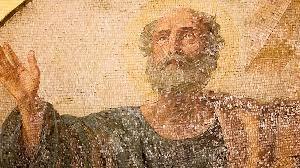Au – A Competent Shepherd 3: 1-6a
A Competent Shepherd
3: 1-6a
A competent shepherd DIG: How do we know that Paul was not commending himself? Who was the basis for his competence? What were the false apostles saying about Paul? How did Paul defend himself against such false accusations? How does the Spirit enable us to obey?
REFLECT: Why would it be encouraging to know that your competence comes not from yourself but from ADONAI? The false apostles said the Corinthians needed Messiah plus a set of rules to be fully acceptable to God. Where do you see this counterfeit gospel today?
The Spirit allows us to obey the teachings of the Torah which are written on our hearts.
A useful and competent shepherd of God’s people does not need to commend himself or depend on the secondhand testimony of others, because his virtuous, godly life is well-known. To defuse any allegation that he was commending himself, Paul made no overt claims in his own defense. Instead, he gently rebuked the Corinthians by asking them two questions, both of which demanded a negative answer from the Greek text.
The first question was: Does Paul’s apostolic authority exist because he says it does, that is, because he commends himself? Paul began by asking: Are we starting to commend ourselves again (3:1a NASB)? The apostle used the editorial we, because it is a less threatening, humbler, more gentle approach than using the singular “I.” What may have prompted Paul’s question were the accusations from the false apostles in Corinth (to see link click Af – The Problem of the False Apostles) that he was in fact commending himself in a proud manner. They may have pointed out the occasions in his first letter when Paul asserted his apostolic authority (First Corinthians 4:15-16, 11:1, 14:18 and 15:10). But in a letter filled with rebuke and correction, Paul’s appeals to his apostolic authority were necessary for the sake of God’s truth. In no way was the apostle motivated by self-exaltation – a truth he reiterates throughout Second Corinthians (5:12 and 10:12).

Paul’s disclaimers reveal that what he wrote was not designed to elevate himself in people’s eyes; it was simply to state the truth so as to protect the legitimacy of his being a competent shepherd. Even his bold claim of a clear conscience (1:12) was not a braggart’s declaration of self-vindication. In his first letter he wrote: I am not aware of anything against me, but this does not make me innocent. The One who is evaluating me is the Lord. So don’t pronounce judgment prematurely, before the Lord comes; for He will bring to light what is not hidden in darkness; He will expose the motives of people’s hearts; and then each will receive from God whatever praise he deserves (First Corinthians 4:4-5). Paul knew that the only commendation that meant anything is the one that comes from ADONAI, not from others, nor even one’s own conscience.
Though he was a humble man, Paul was fully aware of his vital importance to the Corinthians as both a preacher of the Good News supernaturally given to him by God (see the commentary on Galatians Ao – God Set Me Apart from Birth and Called Me Through His Grace) and an inspired writer of biblical revelation. Therefore, it was necessary for him to defend himself so that God’s truth would not be hindered. The sorrow and frustration of his heart over the Corinthians’ fickleness came through loud and clear when he wrote: Are we starting to commend ourselves again (3:1a NASB)? He was not trying to prompt the Corinthians to commend him, but to make them evaluate their attitude towards him. One meaning of commend (Greek: sunistano) is to introduce. After all they had gone through together, did Paul really need to reintroduce himself to the Corinthians? Did they not know him well enough by then? Was it really necessary for Paul to start all over again and prove to them what kind of man, what kind of shepherd he was? After all the time they had known him, after he had ministered among them for at least eighteen months (Acts 18:11), how could they believe the false apostles’ lies about him? Surely they knew him better than that after all the preaching, teaching, fellowship, prayers, love and tears they had personally experienced with him!
Paul drove home his point by asking a second question, also demanding a negative answer: Or do we, like some, need letters of commendation either to you or from you (3:1b NASB)? In their attempt to discredit Paul, the false apostles claimed that he lacked the proper official letters of commendation. Such letters were commonly used in the ancient world to introduce people to those who did not know them (Neh 2:7; Acts 9:2, 18:27, 22:5; Rom 16:1; 1 Cor 16:3). When the false apostles arrived in Corinth, they evidently produced deceptive letters of commendation, possibly purporting to have come from the Messianic community in Jerusalem (Acts 15:24). They used those letters to help them gain acceptance by the Corinthians.
Not only did the false apostles present letters of commendation to the Corinthians, but they also sought them from them. Because they were not saved, the false apostles’ lives were corrupt. As a result, they couldn’t remain very long in one location before being found out. But before moving on, they sought letters of commendation from those whom they had deceived. Then they used those letters to enhance their credibility with their next victims.
But Paul wasn’t like those false apostles. He didn’t need letters of commendation to prove his credibility to the Corinthians; they had first-hand knowledge of his righteous, godly, sincere life and powerful preaching. For the Corinthians to demand letters of commendation from Paul would have been ridiculous. That they could be so foolish and deceived as to doubt what they already knew was true about the beloved apostle was tragic. Paul’s blameless life and effective ministry was his letter of commendation.93
Paul then answered the second question more specifically. His authenticity was evident not only from his blameless life, but also from his impact on the lives of the Corinthians. You yourselves are our letter of commendation, written on our hearts, known and read by everyone. The only testimony Paul needed to verify the divine source of his labor was the reality that the Corinthians had been saved and were being sanctified through the truth he preached and taught. You make it clear that you are a letter from the Messiah placed in our care (3:2-3a). It’s as if Paul was saying, “You are the evidence that our ministry is genuine. Just look at your changed lives. When we came to you the first time, you received our message – the message of the cross of Messiah – and led by the Spirit of the living God, it did its work for you. Others have seen your changed lives. They have read in the letter of your lives the genuineness, authenticity, and sincerity of our ministry. You are all we need to establish the validity of our credentials.” That was Paul’s argument. A compelling argument indeed. Compelling because if anyone had reason to doubt Paul’s genuineness, all they had to do was look into the mirror.94
Unlike the false apostles’ letters of commendation, Paul’s was not written with ink, silent, fading from a page, but by the Spirit of the living God, not on stone tablets but on human hearts (3:3b). The reference to being written on human hearts refers to the nature of the New Covenant. In contrast with the Torah written in stone (see Av – A Glory Transformed), the New Covenant is written on human hearts, literally, on tablets [which are] hearts made of flesh, the TaNaKh uses the same imagery in Proverbs 3:3, 7:3 and Jeremiah 31:33. The prophet Ezeki’el says that when ADONAI regathers the Jewish exiles at the Second Coming, He will take the stony heart out of their flesh and will give them a heart of flesh (Ezeki’el 11:19), and YHVH will put a new Spirit within them (Ezeki’el 36:26).95
Paul was quick to give the glory to God and not himself. Such is the confidence we have through the Messiah toward God (3:4). The Spirit’s work in his ministry justified and explained his confidence as an apostle. It was not an illusory feeling of self-confidence based on his own abilities, strengths, or praise from others. Paul’s competence to fulfill his ministry assigned to him by YHVH (see the commentary on Acts Bc – Sha’ul Turns from Murder to the Messiah) came only by God’s grace through Messiah (First Corinthians 15:9-10). We see more clearly our human limitations when we come face-to-face with Divine omnipotence. But we also see more clearly the power of ADONAI that can work powerfully through human imperfections and frailties.
Dear Wise and Loving Heavenly Father, Praise and thank You for Your great wisdom and Your loving care for each of your children. It is such a comfort to know that You live within those who love You. Yeshua answered and said to him: If anyone loves Me, he will keep My word. My Father will love him, and We will come to him and make Our dwelling with him (John 14:23). You are always right there whenever I need Your help or advice. You never get too sleepy, nor do you ever get too tired to think. You are always wise, alert and with me 24/7 – on dark days and on sunny days, on gloomy, busy days and on quiet days.
It is wonderful to live knowing of Your love. And it is a joy to share Your love with others. Sometimes we are not sure what to say or how to say it and sometimes situations come up unexpectedly before us and we don’t know what to think or how the situation can best be handled. Praise You that you are our competence. You guide us with the right words to use or the wisest action to take. We do not need to worry for the solution does not rest with us; for as we call on You, and You have promised to answer. But if any of you lacks wisdom, let him ask of God, who gives to all without hesitation and without reproach; and it will be given to him (James 1:5). You are a wonderful and awesome Father and I always love to please You. In Your holy Son’s name and power of His resurrection. Amen
Lest anyone misunderstand him, Paul hastened to add the disclaimer: It is not that we are competent in ourselves to count anything as having come from us; on the contrary, our competence is from God (3:5). Ha’Shem had demolished Paul’s former confidence in himself as a Hebrew of Hebrews, a zealous Pharisee who was blameless when it came to righteousness under the Torah (Philippians 3:5-6). He no longer placed any trust in his own heritage, devotion, or natural powers. He knew the only resource from which he could draw was the infinite reservoir of grace provided by God’s empowering Spirit. In saying that believers do not have any competence in ourselves, Paul wasn’t resorting to false humility. He would argue that he was fully competent to carry out his ministry; yet, at the same time, he fully admitted that his competency came entirely from the Ruach Ha’Kodesh, who works in and through him.96
He has even made us competent to be shepherds (Greek: diakonous, meaning servants) serving a B’rit Chadashah, the essence of which is not a written text but the Spirit (3:6a). Once Ezeki’el 36:25-26 and Jeremiah 31:31-34 are seen to be the keys in Paul’s thinking here, the meaning of the contrast between the written text of the Torah and the Spirit becomes easier to understand. The passages from Ezeki’el supply Paul’s references to the work of the Spirit in 3:3b, while the Jeremiah passage provides the focus on the obedience to the Torah and our transformation of the heart that makes that obedience to it possible. Evangelical Christianity, in the early decades of the Twenty-First Century, has suffered significantly from dismissing the Torah’s instruction as a blueprint for living and the witness of the TaNaKh in general. And sadly, when faced with the Ezeki’el 36:25-27 and Jeremiah 31:31-34 passages, that the B’rit Chadashah not only provides forgiveness from sins, but also the ability to obey the Torah of ADONAI, it can be seen how some will merely dismiss or ignore the biblical text.97




















